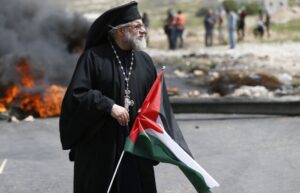At dawn on 22 March, 2004, a half-blind paraplegic cleric was returning home after his prayers in the Mosque in Gaza City when he was assassinated by two low flying Israeli helicopters. Sheikh Ahmed Yassin was the founder of Hamas, an outgrowth of the Muslim Brotherhood in Egypt, and its spiritual mentor. A few weeks later, Yassin’s successor, Abdel Aziz al-Rantisi, was himself assassinated in his car by another Israeli helicopter. The head had been cut off the snake. Much comment at the time was given to the ethics of such targeted assassinations. The British Foreign Secretary at the time, Jack Straw, called the Yassin assassination “unacceptable, unjust”. Tony Blair called it a “setback” for the peace process.
But, ethics aside, how effective was it as a military strategy? I was in Gaza City later that year. A new Hamas leader was in place. Militancy was undimmed. I played football with Palestinian children whose bitterness at “Jews” burnt like a fire within. I spoke to their primary school teacher who told me that they needed a period of throwing things against a wall before lessons in order to get all their anger out. This was the generation of children that would go on to launch the October 7 attack, nearly 20 years later.
Others argued that the assassination of Yassin was a mistake because he was a “moderate” — which, of course, is a relative term in Gazan politics. “It was Yassin the incarnation of evil in the eyes of Israelis who kept Hamas in line and ensured that its violent outbursts were measured, calibrated, and doled out strategically rather than haphazardly,” wrote Barak Barfi. “He understood the limits of violence. His successors recognise no such limits.” It seems to me ridiculous to talk of someone who supported and promoted suicide bombings as being a moderate. Yassin was a terrible man. But there were worse to come. And Yahya Sinwar proved it.
It was Yassin who first recruited Sinwar back in the Eighties. Yassin appreciated the fact that Sinwar was a Hafiz — that he had memorised the Quran word for word. When only 25, Sinwar became the Hamas enforcer, punishing local Gazans for morality offences such as selling pornographic videos. It is said he tortured a fellow Hamas commander for over a year before murdering him in 2016, on the grounds of “moral violations”, code for homosexuality. He was known to be especially brutal in seeking out Israeli collaborators. There is a story that he made one collaborator’s brother bury him alive — but with a spoon rather than a shovel. Sinwar was a monster. Ordinary Gazan people were terrified of him. And, of course, Sinwar was the mastermind of the October 7 massacre. Which may be why, 20 years after Yassin’s assassination, our Prime Minister has taken a very different line from his predecessor: “I, for one, will not mourn a terror leader like Sinwar”.
But will his death change anything? Certainly, it has given Israelis something to cheer about. As his death was announced over the tannoy on the beach in Tel Aviv, bathers jumped up and down and shouted in triumph. More than anyone else, Sinwar bears responsibility for the suffering brought upon the people of Gaza and Israel.
But what difference will it make? Is the Israeli strategy of targeted assassination just a brutal version of whack-a-mole, killing one leader only for another, perhaps even more brutal, to take his place? When I was at school, we used to tell the story of history through kings and queens and military leaders. By the time I got to university, we were being taught that underlying social movements were far more important, that history happened “from below” and that leaders were just a kind of epiphenomenon of deeper social forces. This matters: if Sinwar was the product of deep social bitterness, then new monsters will emerge; however, if Sinwar and his like were responsible for violently imposing his gruesome ideology on the people of Gaza, then his death brings a certain hope.
A video posted on X gave me some hope the latter might be true. A man, seemingly from Gaza, surrounded by half-a-dozen children in a field of tents, sent a message in heavily accented Hebrew to the “citizens of the state of Israel”. He compared his own people living in tents with the Jewish festival of Sukkot, during which Jews live in temporary dwellings to mark, among other things, the fragility of human life. He spoke of the need for shalom. Oh God, I hope this video isn’t a fake.
But if Hamas have had their foot on the throat of such people, terrorising them into submission, then the death of Sinwar makes it more possible for many more such expressions of reconciliation to take place — and that means that there is light at the end of the tunnels. As the historian Simon Sebag Montefiore put it: “The big question is: can the wounded, grieving, heartbroken, enraged two nations of Israelis and Palestinians find a way to create a path out of this hell?”
There is one significant reason this assassination could be different. Symbolism matters. That the mastermind of October 7 is now dead could provide an off ramp for this horrendous war. The Americans will inevitably try to cast it as such. And perhaps even Netanyahu, now with increasing popularity back home, may feel he has just enough political authority to marginalise those ultra-hardliners in his cabinet for whom little short of the annihilation of Gaza will suffice as victory. He has described Sinwar’s death as “the beginning of the end” of the war. Certainly, a ceasefire in the Strip feels more possible now than it did a few days ago. But Hamas will still have to release the hostages for the war to end. And they may decide to murder more of them. In any case, the Israelis think that they are winning — so why stop now?
Sinwar’s death may be satisfying emotionally — and the absence of a rocket attack from Gaza following his death indicates how depleted his army had become — but the basic drivers of the conflict nonetheless remain in place. Too many of Israel’s neighbours are committed to its eradication. Iran will continue to supply arms and money to terrorists who seek the death of Jews. They will continue to develop nuclear weapons. Things are a long way from over.
Disclaimer
Some of the posts we share are controversial and we do not necessarily agree with them in the whole extend. Sometimes we agree with the content or part of it but we do not agree with the narration or language. Nevertheless we find them somehow interesting, valuable and/or informative or we share them, because we strongly believe in freedom of speech, free press and journalism. We strongly encourage you to have a critical approach to all the content, do your own research and analysis to build your own opinion.
We would be glad to have your feedback.
Source: UnHerd Read the original article here: https://unherd.com/




